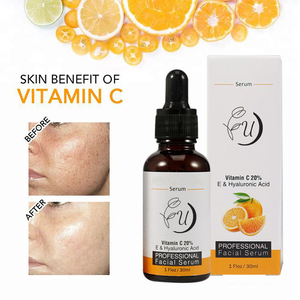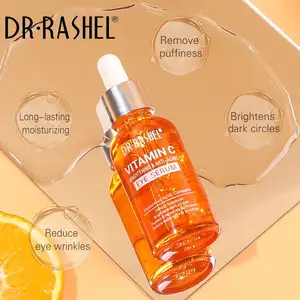(79393 products available)








































































































































































































Vitamin C serums are skin care products known for their brightening and anti-inflammatory properties. The different types of vitamin C serum are based on their solubility.
Water-soluble vitamin C serum
As the name implies, these serums have a high concentration of vitamin C in the form of L-ascorbic acid. They provide excellent antioxidant protection and are very effective at brightening the skin and improving its texture. However, because they are highly concentrated, they can irritate the skin, especially for people with sensitive skin. To counter this, manufacturers include other soothing ingredients like aloe vera.
Water-soluble vitamin C serums are perfect for individuals who want to eliminate dark spots on their faces due to acne or sunburn.
Oil soluble vitamin C serum
These vitamin C serums are made with fat-soluble vitamin C (vitamin C esters). They offer similar antioxidant effects as water-soluble serum but are less irritating. This makes them suitable for sensitive skin. However, they are not as effective as their water-soluble counterparts in brightening the skin.
On the upside, fat-soluble vitamin C serums have a longer shelf life and are more stable.
Hybrid vitamin C serum
Hybrid vitamin C serum combines both oil- and water-soluble vitamin C. This gives users the best of both worlds. They enjoy the stability and longer shelf life of esterified vitamin C and the high potency of L-ascorbic acid. However, this serum tends to be more expensive than the others.
Before choosing a vitamin C serum for wholesale, it is essential to understand what customers want. Do they want something that reduces wrinkles or fine lines? Or do they want something that will lighten up their dark spots? Knowing this will help buyers choose the right serum for their customers. Here are other factors to consider when choosing vitamin C serum for wholesale:
Form of vitamin C
There are different forms of vitamin C, each offering different benefits. Some of the most common forms of vitamin C are ascorbic acid, sodium ascorbate phosphate, L-ascorbic acid, and ascorbyl palmitate. The most effective form among these is the ascorbic acid. This is because it penetrates the skin and gets better results. However, it can irritate sensitive skin. The sodium ascorbate phosphate is the most gentle form, but it is less effective than the ascorbic acid.
Brand
The brand determines the quality of the serum. It is advisable to choose vitamin C serums from reputable brands. These brands use quality ingredients to make the serum. In addition, they test the serum to ensure it is safe and effective for the users. Choosing a reputable brand may be expensive, but it is worth every coin.
Packaging
How the serum is packaged affects the quality of the product. Vitamin C serums can be packed in tubes, pump bottles, or glass dropper bottles. Tubes and pump bottles are better options because they reduce the amount of air and light that gets into the serum. Exposure to air and light reduces the potency of vitamin C. This serum may become useless after some time, even if it is stored properly. Vitamin C serum in glass dropper bottles is not recommended because it has no protection against air and light.
Concentration
The concentration of vitamin C in the serum affects the price and performance. A high concentration of vitamin C can irritate sensitive skin. On the other hand, a low concentration may not provide the expected results. It is advisable to choose serum with concentrations of 10% to 20%.
Additional ingredients
Some serum have additional ingredients that provide more benefits to the skin. For example, vitamin E and ferulic acid enhance the effectiveness of the vitamin C in the serum. Hyaluronic acid is another great addition. It keeps the skin hydrated.
Using vitamin C serum for the face has become a crucial part of any skincare routine. Many manufacturers provide instructions on how to use and apply the serum to the face.
Cleanse
Always start by washing the face with a gentle cleanser. This helps remove dirt, oil, and any other debris from the face. It also helps open up the pores so the vitamin C serum can be easily absorbed. Allow the face to dry completely before applying the serum.
Apply
Shake the vitamin C serum bottle before use. This ensures the product is well-mixed. Squeeze a small amount of the serum on the fingertips. Gently dab the serum on various parts of the face, such as the cheeks, forehead, and chin. Spread it evenly across the face while avoiding the eye area.
Absorb
Allow the vitamin C serum to absorb into the skin. This can take about a minute or two, depending on the product. Do not touch the face during this period to avoid any distraction. The serum can easily transfer from one fingertip to another.
Moisturize
After the serum has been absorbed, apply a moisturizer of choice to the face. This locks in the serum and provides extra protection to the face. It also prevents the face from drying out. Some people use creams, oils, or lotions as moisturizers.
There are no harsh chemicals or ingredients in vitamin C serum for oily skin. This makes it safe for all types of skin. However, some people may be sensitive to vitamin C serum due to allergies. To check how safe the serum is, conduct a patch test. Apply the serum on a small part of the skin, like the wrist. Leave it for 24 hours and check if there are any side effects. If the serum causes redness, irritation, or itchiness, it's better to look for another product.
Antioxidant
Vitamin C is a powerful antioxidant that protects the skin from environmental stressors such as pollution and UV rays. It neutralizes free radicals, preventing oxidative stress and its harmful effects on the skin.
Brightening
One of the most sought-after functions of vitamin C serum is its ability to brighten the skin. It inhibits the production of melanin, the pigment responsible for dark spots and hyperpigmentation. As a result, the skin appears more radiant and even-toned.
Anti-Aging
Vitamin C serum minimizes the appearance of fine lines and wrinkles by stimulating collagen production. This keeps the skin firm and youthful. Moreover, it also helps to repair and rejuvenate the skin, making it look smoother and more youthful.
High concentration
These serums are highly concentrated with vitamin C. This makes them very effective in providing results. However, the high concentration can irritate sensitive skin.
Various formulations
Vitamin C serums are available in different formulations. This includes pure vitamin C serums and those combined with other ingredients such as hyaluronic acid and niacinamide. The different formulations cater to different skin types and needs.
Lightweight and fast-absorbing
Many vitamin C serums have a lightweight and water-like texture so they can be absorbed quickly into the skin. This makes it feel comfortable and non-greasy. Some vitamin C serums also have a slightly oily texture.
Packaging
Vitamin C serums are often packaged in dark bottles with pipettes. The dark bottle protects the serum from light exposure, which can degrade the vitamin C over time. Some serums are also packaged in air-tight containers for the same reason.
Labeling
When serum is packaged, it is labelled with the vitamin C concentration, the type of vitamin C used, and other ingredients in the serum. Some labels also provide information on the type of skin the serum is best suited for and how to use it.
Q1. What is the shelf life of a vitamin c serum?
A1. The average shelf life of vitamin C serums ranges from 12 months to 2 years. This depends on the composition and packaging. Those that come in airtight and opaque packaging last longer. Because they are not exposed to air and light, which affects potency.
Q2. Can buyers order customized vitamin C serums?
A2. Many manufacturers allow buyers to make custom orders. They offer different options for formulation, packaging, and labels. This gives businesses and cosmetic companies control over the product to meet their target market's needs.
Q3: What are some sustainable packaging options?
A3: Sustainable packaging options include recycled plastic, bamboo containers, and glass jars with a high percentage of recycled material. Using this packaging aligns with the current market trend to reduce plastic waste and create a sustainable environment.
Q4: Can vitamin C serums expire?
A4. Yes, vitamin C serums can expire. Many come with expiration dates to guide users. After the expiration date, the potency of vitamin C will reduce. This may affect the serum's intended benefit. It is better to always use vitamin C serum before its expiration date.